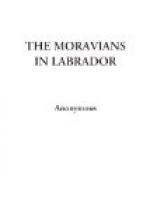Like the Greenlanders the inhabitants of Labrador must draw their subsistence and their wealth chiefly from the sea; but in this respect their circumstances are less favourable than the former. Whales are scarce, and the chief species they take is that denominated the white fish, of little value in commerce. In pursuing them they have now adopted the European boat in preference to their own, and those most frequently employed are six oared, rowed by twelve men. The harpooner stands in the bow with his harpoon, or iron spear, which is stuck on a shaft one or two fathoms long, and is provided with a leathern thong of considerable length, to which are attached from five to ten bladders of seal skin. If the whale be struck he immediately dives to the bottom of the sea, where he remains till he is quite exhausted, when he again comes to the surface of the water to breathe; in the meanwhile the boat’s crew observe all its motions, and are in readiness with their lances to complete the business, during which, the person who first struck the fish, falls down on his face in the fore part of the boat, and prays that Torngak would strengthen the thongs that they may not break; another of the crew allows his feet to be bound, as a symbol of what he desires, then attempting to walk, falls down and exclaims, “Let him be lame!” and a third, if he observes that the whale is dying, calls out, “Now Torngak is there, and will help us to kill the fish, and we shall eat his flesh, and fare sumptuously, and be happy!” But if the whale appears likely to escape, the first continues lying on his face crying out with vehemence, “Hear yet, and help us!” If the whale get off, some of their conjurors inform them that Torngak was not there, or he did not hear, or he was otherwise employed! Seals are more abundant, and are the chief dependance of the natives, their flesh serving for food, their skins for clothes and covering to their tents and boats, and their blubber for oil or for exchange. Catching the seal was formerly a tedious and laborious process, but now they are generally taken in nets, which the natives have adopted from the Europeans.




